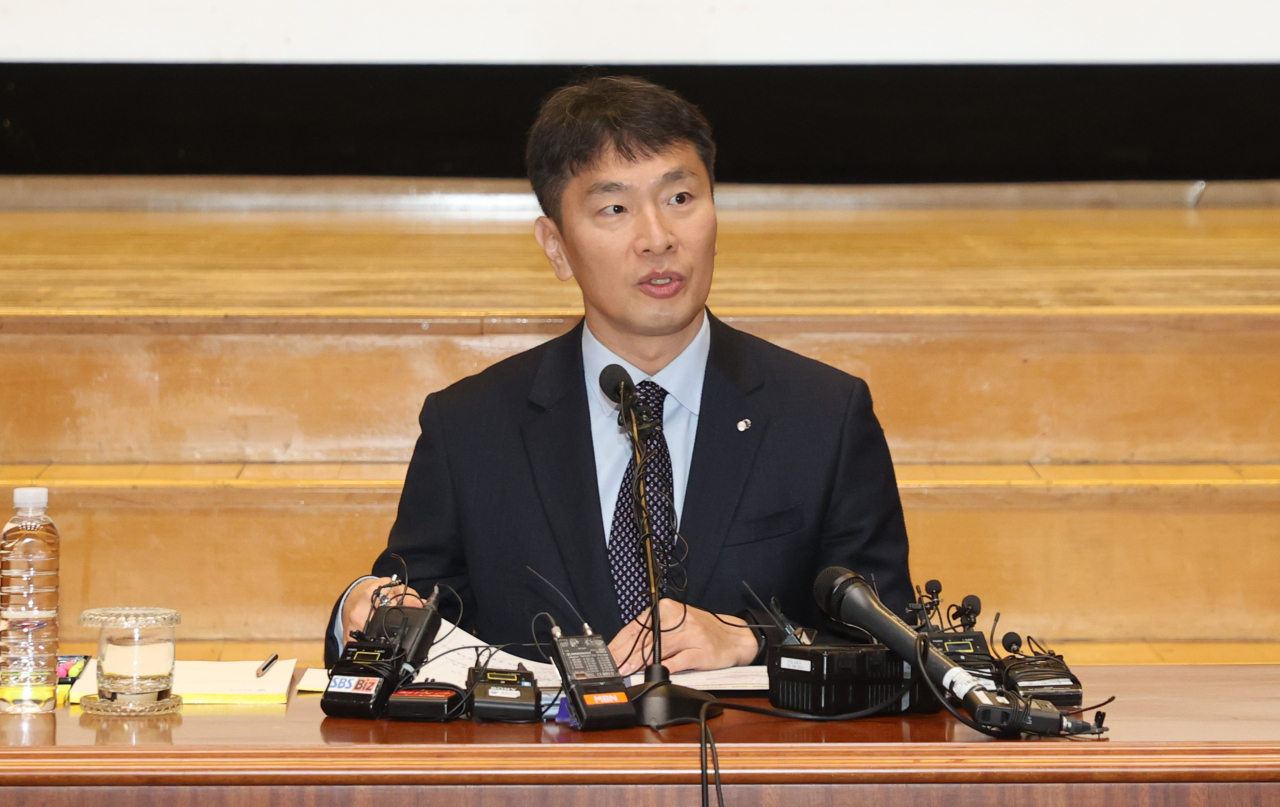 |
Lee Bok-hyun, chief of the Financial Supervisory Service, speaks during a press conference held to announce its plans for the new year at the financial watchdog's headquarters in Seoul, Monday. (Yonhap) |
South Korean financial regulators are set to collaborate with their counterparts in Hong Kong as part of its ongoing investigation into illegal short selling involving Hong Kong-based companies.
The Financial Supervisory Service on Monday announced plans to dispatch working-level officials to Hong Kong in early February to facilitate this cooperation.
FSS Chief Lee Bok-hyun disclosed this initiative during a meeting with local journalists at the agency's headquarters in Seoul, where he outlined its plans for the year ahead.
"We intend to brief Hong Kong authorities on the developments regarding our short selling investigation when our working-level team visits them in February and seek their assistance," Lee stated, noting that he or other senior officials will follow up with a visit in the first half of the year.
Last month, South Korea levied its largest-ever fine against Hong Kong-based investment banks for engaging in illegal naked short selling in the local stock market.
The Hong Kong branches of French investment bank BNP Paribas and HSBC were fined 26.52 billion won ($19.86 million) for violating regulations under the Capital Markets Act, which prohibit naked short selling. Both banks have been referred to prosecutors.
Following the initial discovery of illegal trading by the two banks in November, the FSS imposed a temporary ban on all short selling until June.
Expanding its investigation to include other major global investment banks, the FSS uncovered two additional firms suspected of illegally shorting approximately 54 billion won in the local market, with investigations underway, according to Lee. The results of the probe is expected to be announced by the end of March, he added.
Looking ahead, Lee plans to visit New York in the next quarter to meet with Gary Gensler, chair of the US Securities and Exchange Commission.
Originally scheduled for January to discuss cryptocurrency regulation, the meeting was postponed, likely due to ongoing domestic issues, such as the real estate financing crisis and the equity-linked securities debacle.
While the specific date remains unspecified, Lee intends to meet with the SEC chair between May and June "to discuss South Korea's efforts" to address market undervaluation issues.
The South Korean government has unveiled a series of policies to counteract the persistent "Korea discount" issue. Among these measures is the recently introduced "value-up" program, which targets the enhancement of underperforming local stocks.
Lee emphasized "the significance of SEC policies on the global economy" and pledged to raise various topics during the meeting, including crypto regulation and bitcoin exchange-traded funds.
Additionally, Lee promised to establish a compensation scheme for victims of the ELS fiasco by the end of this month.
South Korea is grappling with 10.2 trillion won worth of ELS derivatives linked to the Hang Seng China Enterprises Index set to mature in the first half of this year. With a principal loss ratio averaging around 53 percent, potential losses could reach approximately 6 trillion won if the index remains at its current level of 5,200 points.
Since early January, the FSS has conducted on-site investigations into around a dozen financial institutions suspected of misselling ELS products.
Lee stated that the watchdog will categorize the various forms of misselling uncovered through the probe so far before the upcoming Seollal holiday and devise a set of compensation measures by the end of February.







